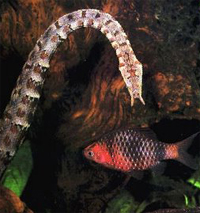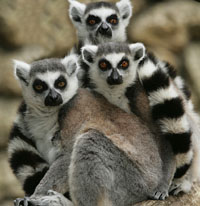Science
Flesh Eating Robots
A couple of designers, James Auger and Jimmy Loizeau, from the UK have created five robots that have a taste for meat. The "robotic furniture" is designed to look cool and to catch flies and mice. Once caught, the vermin are digested and turned into energy to power the machines. NewScientist
Posted By: mdb777 - Tue Jul 07, 2009 -
Comments (3)
Category: Design and Designers, Furniture, Inventions, Science
Sneaky Snakes

Posted By: Nethie - Fri Jul 03, 2009 -
Comments (3)
Category: Animals, Food, Nature, Science
A Miracle or a Freak of Nature?

Posted By: Nethie - Fri Jun 26, 2009 -
Comments (5)
Category: Family, Health, Medicine, Science
Great News For The Environmentally Unconscious

Posted By: Nethie - Tue Jun 16, 2009 -
Comments (5)
Category: Inventions, Science, Technology, Natural Resources
Inventions of Buckminster Fuller, Part 5: Dymaxion Sleep
This was more a concept than an invention. It is also known as polyphasic sleep, meaning sleeping at more than one interval during a day. Although not really invented by Fuller, he did popularize it and gave it a catchy nickname. Bucky claims to have slept only 30 minutes every 6 hours and did not suffer any ill effects. You can read a story about it in Time Magazine's archives.
Posted By: fyshstyxx - Wed Jun 10, 2009 -
Comments (1)
Category: Health, Science, Sleep and Dreams, 1940s, Brain
One Step Closer To The Matrix

Posted By: Nethie - Thu Jun 04, 2009 -
Comments (1)
Category: Medicine, Science, Technology, More Things To Worry About, Brain
Some More Food Related Weirdness
Returning to a topic close to my heart (well, the cholesterol is at any rate), I'd like to start this food of the weird round-up with an intriguing piece of recent research that chocolate milk may, in fact, be a better "sports drink" than many sports drinks. In trials conducted by scientists from James Madison University on thirteen college football players, low-fat chocolate milk outperformed commercial high-carbohydrate recovery drinks, with tests showing lower levels of kinases associated with muscle strain. Though equally effective as a training aid, chocolate milk is unlikely to replace sideline "energy" drinks like Gatorade anytime soon. Which is a pity, if nothing else, a switch to chocolate milk would enliven the coach's traditional "post-game shower" (Net Doctor).Of course, the athletic benefits of chocolate could only be improved by adding a protein supplement, right? Well not if, as alleged by one Tampa Bay business, that extra protein came in the form of an infestation of moths. Wholesaler "Mar-Len Confections" and retailer "Chocolates by Michelle" are currently suing one another over the fate of a shipment of $4500 worth of chocolate supplied by the former. According to Michelle Palisi, owner of the eponymous business, the chocolate was contaminated with live moths, meaning she not only had to throw out the shipment and replace it, but also had to hire an exterminator to eradicate the moths and clean the building. Wes Niedecken, owner of Mar-Len, disputes this, blaming poor pest control on the part of Palisi. The moths themselves are not unusual, and candy - especially chocolate - is a particular favourite of caterpillars. Fortunately for the consumer, the FDA has strict rules in place... no more than 60 insect parts per 100 grams of chocolate (St. Petersburg Times).
Also coming up for a food related day in court is NC teen John Szwalla, who tried to hold up a convenience store... with a banana. The 17 year-old, now facing charges of attempted armed robbery, initially told staff at the Winston-Salem store that he had a gun, though the truth quickly became apparent when owner Bobby Rae Mabe and a customer managed to jump Szwalla and pin him to a chair. The would-be robber then tried to dispose of the evidence by, you guessed it, eating the banana. He was unable to dispose of the peel however and police later took it away as evidence. Recalling his harrowing experience Mabe said, "If he had had a gun he would've shot me, but he had a banana" (Sky News).
But while the humble banana might not be the weapon of choice, it can still make you money. At least, that's what banks in Davao in the Philippines think. Fresh from the success of sub-prime mortgages, banks are apparently eyeing banana plantations as the next big growth sector. One local bank plans to double its $27 million investment in bananas by the end of the year, citing growing demand. Said bank president Alex Buenaventura, "Banana has become the fabled duck that lays golden eggs" (Business Mirror).
While it's easy to mock, perhaps Mr. Buenaventura enthusiasm mightn't be quite the joke it first appears. Banana imports to Japan have leapt over 25% in just a few months on the back of a new diet craze, the "Morning Banana" diet. Initially aired on a social networking site, this new fad has already spawned four bestselling books and a raft of TV endorsements, with public and celebrities alike lining up to show off their new - banana-induced - bodies. As for the diet, it is simplicity itself, just eat bananas for breakfast, and nothing else, then enjoy whatever you want for lunch and dinner (Inventor Spot).
More in extended >>
Posted By: Dumbfounded - Wed Jun 03, 2009 -
Comments (6)
Category: Exercise and Fitness, Fads, Science, Sports, Stupid Criminals, Nutrition, Bananas
Weird Wildlife
It's a law of nature that when you've got to go, you've got to go. So if you happen to be a penguin out on the antarctic ice, well, that's where you've got to go. Which turns out to be an extremely useful fact for scientists, who have used piles of penguin poo identified on satellite images to locate where penguin colonies form. Researchers from the British Antarctic Survey hope to use the new technique to follow the penguins over many seasons and determine how much impact global warming is having on the species (Telegraph).Meanwhile British beekeepers must be cursing that not all animals can be tracked by satellite so easily after an outbreak of bee-rustling has swept the coutryside. The spate of thefts has been provoked by rises in the price of honey combined with a shortage of bees brought about by disease. In the largest bee-heist so far, 18 hives containing over a million bees were stolen from a strawberry field they had been pollinating. According to John Howat of the Bee Farmers Association, pulling off such an audacious crime would require "inside knowledge" (BBC News).
And it's not just beekeepers who are missing their wildlife. A UK radio station that has broadcast nothing but a repeating loop of birdsong for 18 months as "filler" has finally shut down to make way for a new commercial station, and raised howls of protest from many of its half a million regular listeners. The twenty year-old recording, made in a wiltshire garden and used by the radio station free-of-charge, became a massive hit with people from all over Britain, including author Terry Pratchett, who found it a relaxing alternative to the usual radio fare. The replacement broadcast, Amazing Radio, plays music by unsigned bands uploaded to amazingtunes.com (Pocket Lint).
Finally, here's one story that almost missed the boat (ark?), swimming with stingrays may be harmful... for the stingrays. Scientists monitoring the sealife around the Camen islands have found that tourist excursions to pet the wildlife around the islands is leading to weaker immune systems and poorer health in the animals. Christina Semeniuk, an ecologist at Simon Fraser University in Canada, cited collisions with boats, overcrowding and hand-fed squid forming an greater part of their diet as the main suspects. She pointed to other studies on bears, penguins, dolphins, and apes which also showed increased stress and illness due to wildlife tourism (Guardian).
Posted By: Dumbfounded - Tue Jun 02, 2009 -
Comments (7)
Category: Agriculture, Animals, Crime, Science
The Missing Link

Now I don't generally have a problem with thinking that my great, great, great (many greats) ancestors were apes. Especially judging by some of the men I've dated. But lemurs? Did any of you see the movie, Madagascar?
Posted By: Nethie - Tue Jun 02, 2009 -
Comments (13)
Category: Animals, History, Science, More Things To Worry About
Inventions of Buckminster Fuller, Part 3: The Dymaxion Map
This one is somewhat simpler than Bucky's other innovations, but no less impressive.
More in extended >>
Posted By: fyshstyxx - Wed May 27, 2009 -
Comments (2)
Category: Education, Inventions, Science

| Who We Are |
|---|
| Alex Boese Alex is the creator and curator of the Museum of Hoaxes. He's also the author of various weird, non-fiction, science-themed books such as Elephants on Acid and Psychedelic Apes. Paul Di Filippo Paul has been paid to put weird ideas into fictional form for over thirty years, in his career as a noted science fiction writer. He has recently begun blogging on many curious topics with three fellow writers at The Inferior 4+1. Contact Us |




